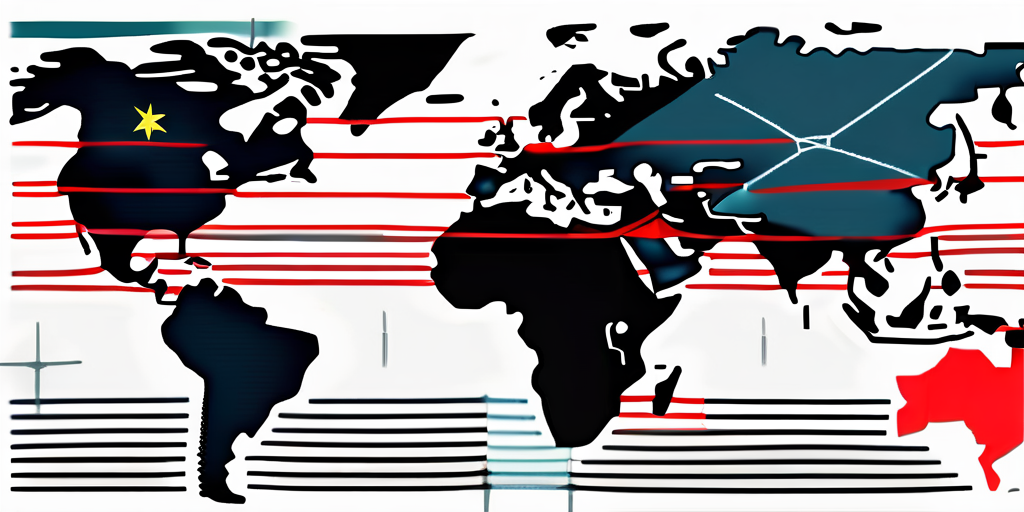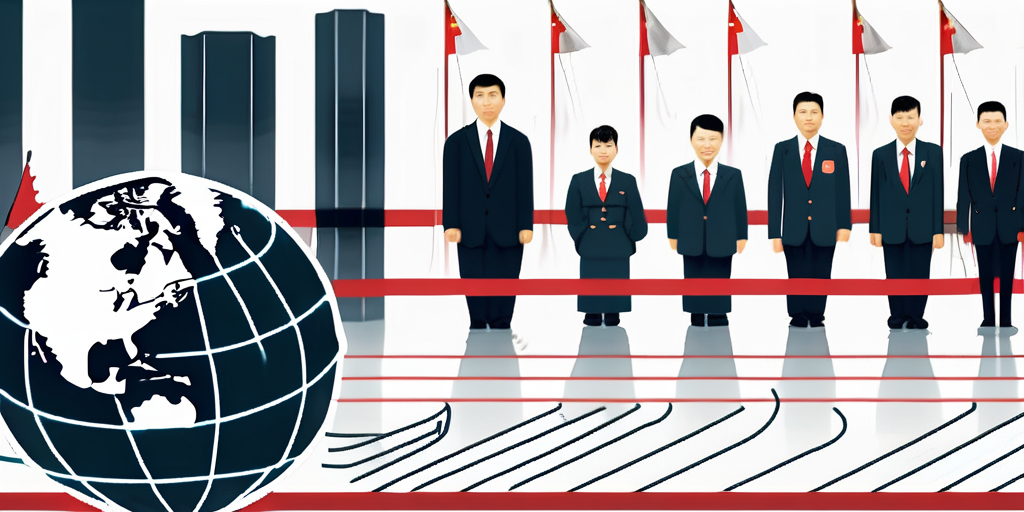Interpol, the international law enforcement organization, has recently issued an alert regarding China’s latest notice. This development has garnered significant attention, as it shines a spotlight on the complex dynamics of global security and the role played by Interpol. To truly understand the implications of China’s notice, it is important to first grasp Interpol’s structure and function.
Understanding Interpol’s Role in Global Security
Interpol, short for the International Criminal Police Organization, serves as a crucial network that facilitates international police cooperation. Established in 1923, Interpol operates as an intermediary platform for law enforcement agencies across 194 member countries. Its primary objective is to promote collaboration and coordination in tackling transnational crime.

Transnational crime poses a significant challenge to global security, with criminal activities such as drug trafficking, human trafficking, terrorism, and cybercrime transcending national borders. Interpol plays a vital role in addressing these threats by fostering information sharing, operational support, and capacity building among its member countries.
Interpol’s organizational structure is based on its General Assembly, Executive Committee, and the Secretariat. The General Assembly, consisting of representatives from each member country, meets annually to discuss and make decisions on strategic matters. The Executive Committee, composed of representatives from the member countries’ law enforcement agencies, oversees the implementation of policies and resolutions. The Secretariat, headquartered in Lyon, France, serves as the administrative hub of Interpol, coordinating its day-to-day activities.
To ensure effective communication and cooperation, each member country appoints a National Central Bureau (NCB), which acts as the liaison between the national law enforcement agencies and Interpol. The NCBs facilitate the exchange of information, intelligence, and operational support among member countries. This collaboration is crucial in identifying and apprehending criminals who operate across borders.
Interpol’s key functions include issuing notices, coordinating international operations, and providing global databases for criminal investigations. One of the most recognized notices is the Red Notice. The Red Notice serves as an international alert seeking the location and arrest of wanted individuals. It provides member countries with essential information about the wanted person, such as their identity, alleged crimes, and any specific actions to be taken upon their arrest.
However, it should be noted that the Red Notice is not an international arrest warrant in itself, nor does it guarantee the arrest or extradition of the subject. Instead, it serves as a powerful tool for member countries to request cooperation from other countries in locating and apprehending individuals wanted for serious crimes. The decision to act on a Red Notice lies with the individual member countries, who may have their own legal processes and requirements for extradition.
Interpol’s global databases play a crucial role in supporting criminal investigations. The organization maintains databases on stolen and lost travel documents, fingerprints, DNA profiles, and stolen works of art. These databases enable law enforcement agencies to quickly access and share critical information, aiding in the identification and apprehension of criminals.
Interpol also plays a significant role in combating cybercrime, which has become a growing threat in the digital age. The organization operates a dedicated unit, the Interpol Global Complex for Innovation (IGCI), which focuses on developing innovative strategies and tools to combat cyber threats. The IGCI works closely with member countries, private sector partners, and international organizations to enhance global cybersecurity and strengthen law enforcement capabilities in this domain.
In conclusion, Interpol’s role in global security cannot be overstated. By promoting international police cooperation, facilitating information sharing, and coordinating operations, Interpol plays a vital role in combating transnational crime. Through its organizational structure, notices such as the Red Notice, and global databases, Interpol provides law enforcement agencies with the tools and resources necessary to apprehend criminals and maintain global security.
China’s Recent Interactions with Interpol
China’s utilization of Interpol has both historical context and recent developments that warrant examination. A closer look at China’s past interactions with Interpol sheds light on its approach to international collaboration in law enforcement.

China’s Use of Interpol in the Past
Over the years, China has actively engaged with Interpol to seek assistance in tracking down individuals wanted for crimes committed within its borders. This collaboration has included the issuance of Red Notices against Chinese nationals involved in cases ranging from corruption to economic crimes.
One notable example of China’s use of Interpol is the case of Lai Changxing, a businessman accused of running a massive smuggling operation in the 1990s. China sought Interpol’s help in locating and extraditing Lai, who had fled to Canada. The Red Notice issued by Interpol played a crucial role in Lai’s eventual arrest and extradition back to China.
Another instance where China utilized Interpol effectively was in the case of Zhou Yongkang, a former high-ranking Chinese official convicted of corruption. Interpol’s cooperation with China led to the issuance of a Red Notice against Zhou, facilitating his arrest and subsequent trial.
Recent Interpol Notices Issued by China
In recent times, China has stepped up its utilization of Interpol notices to target individuals it considers to be threats or suspects. This has led to increased scrutiny and debate, as some argue that China’s motivations may extend beyond law enforcement and into the realm of politics.
One high-profile case that drew international attention was the Interpol Red Notice issued for the arrest of Meng Hongwei, the former president of Interpol and a Chinese national. Meng mysteriously disappeared during a trip to China in 2018 and was later revealed to have been detained by Chinese authorities on corruption charges. The incident raised concerns about China’s influence within Interpol and its potential misuse of the organization for political purposes.
China’s increased use of Interpol notices has also sparked discussions about the effectiveness and transparency of the Red Notice system. Critics argue that China’s extensive use of Red Notices raises questions about the credibility and impartiality of Interpol, as it may be susceptible to abuse by member states for political or personal agendas.
Furthermore, the growing number of Interpol notices issued by China has prompted calls for reforms within the organization. Some advocate for stricter criteria and more rigorous vetting processes to ensure that Red Notices are not misused or politically motivated.
In conclusion, China’s past and recent interactions with Interpol reveal a complex relationship between the country and the international law enforcement organization. While China has benefited from Interpol’s assistance in apprehending wanted individuals, concerns about the potential politicization of the Red Notice system persist. As the global landscape continues to evolve, it remains crucial to monitor and evaluate the dynamics between China and Interpol to ensure the integrity and effectiveness of international law enforcement cooperation.
The Implications of China’s Latest Notice
China’s latest notice has implications that extend beyond its national borders. By understanding the potential political motivations behind the notice and examining its impact on international relations, we can begin to comprehend the broader significance of this development.

Potential Political Motivations
China’s utilization of Interpol notices, particularly against dissidents and individuals critical of the ruling regime, raises concerns about the potential politicization of the Red Notice system. Critics argue that these actions may be used as a tool to suppress political dissent and silence opposition.
Impact on International Relations
China’s latest notice has generated reactions from countries worldwide. Some nations have expressed support for China’s actions, citing the importance of maintaining international law and order. Others, however, have raised concerns about the potential misuse of the Interpol system and its impact on human rights.
Analyzing the Global Response
The latest Interpol notice issued by China has sparked a variety of reactions from major world powers. Understanding these responses and analyzing the role of international media in shaping perceptions will offer valuable insights into the global dynamics surrounding this development.
Reactions from Major World Powers
Leading countries have taken different stances on China’s notice, reflecting complex geopolitical considerations. Some nations see this as an opportunity to strengthen ties with China, while others question the intentions behind the notice and call for greater transparency in Interpol’s processes.
The Role of International Media in Shaping Perceptions
The international media’s coverage of China’s latest notice plays a vital role in shaping public opinion and influencing diplomatic discourse. It is important to critically evaluate media narratives, taking into account different perspectives and potential biases.
Future Predictions: Interpol and China
Considering the significance of the latest notice and its potential implications, it is worth exploring possible scenarios for China’s future interactions with Interpol. Additionally, understanding the long-term impact on global security is essential for predicting the direction of international law enforcement cooperation.
Possible Scenarios for China’s Future Interactions with Interpol
China’s approach to Interpol notices may continue to evolve, influenced by factors such as its domestic political landscape and the international community’s response. Possible scenarios include increased collaboration, greater scrutiny, or a shift in China’s posture altogether.
The Long-term Impact on Global Security
The dynamics between China and Interpol carry implications for global security and the effectiveness of international law enforcement cooperation. It is crucial to assess how the latest notice will shape future practices within Interpol and influence the organization’s ability to combat transnational crime.
The recent Interpol notice issued by China has brought attention to the intricate relationship between the organization and its member countries, shedding light on global security dynamics. Understanding Interpol’s role, China’s interactions within the system, and the broader implications of this notice enables a comprehensive analysis of the situation. As events unfold and reactions from major world powers continue to shape the discourse, the future of Interpol-China relations and its impact on global security will undoubtedly be closely monitored.
